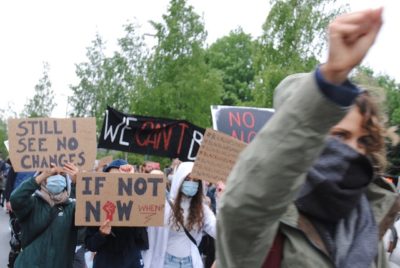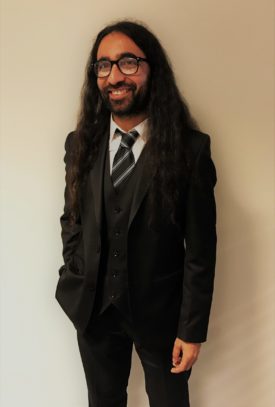COMMENTARY: A vision-impaired doctoral candidate at Oslo Metropolitan University questions how a country like Norway, which scores high on the Human Development Index, isn’t more open, inclusive and enlightened on integrating people with impairments into society. It’s time, he suggests, to confront “ableism” as much as racism.
****************************************************************

From Minneapolis to Oslo, San Francisco to Stavanger, Boston to Bergen: The racism debate has flared up on the streets and in the media. The tragic demise of George Floyd has triggered silent protests and loud demonstrations against police brutality, institutional discrimination and systemic oppression experienced by minority groups.
Something special seems to be in this summer air, as people from different walks of life are willing to listen to the marginalized voices, learn from the silenced experiences, and kneel in solidarity to fight the scourge of racism. Differential or discriminatory treatment based solely on a group identity marker such as race instinctively feels abhorrent to our egalitarian sensibilities. At this moment, while most are repulsed by acts of racism, I would like to introduce a lesser known –ism, which quietly seems to permeate in Norway and beyond.
This –ism affects us all, irrespective of gender, class, race, sexual orientation or any other identity markers. It’s ableism, based on the word “able” and a set of conscious or unconscious assumptions and actions that can result in unequal treatment of people with actual or perceived impairments. Ableism operates at both individual and institutional levels, and involves repressive, abusive or discriminatory behavior.

I’m writing about ableism because I’m a blind, non-Norwegian PhD fellow, researching disability policy and work inclusion in Norway. Not only do I research the complex effects of ableism in my sequestered office at the Oslo Metropolitan University, the streets of Oslo bring me face-to-face with amusing, ableist instances.
Imagine me standing at the tram stop outside my university, waiting for the number 18 tram to my home. While I am pondering the joys the evening will hold, suddenly, a kindhearted Ola takes me by the arm and guides me to tram 11. Perhaps he needs my company, but I want to go home. I politely decline the unsolicited help and bid farewell to the benevolent soul. At many a wine-soaked social get-together, a compassionate Kari showers me with undeserved fame simply for completing higher education and working full-time. I recoil with embarrassment as she places me on the pedestal of “wow,” while in my head I wonder why and how. Last but not least, concerning the accessibility of websites and general environment, I often feel like the protagonist in a future Oscar-winning film: “No Country for Blind Men.”
You may ask that if ableism doesn’t bother me, why should I care? It’s because a disability is more universal than you think. It is one faulty ski trip, an extra chromosome or a delayed diagnosis away. We probably all know of someone with a disability, and if we’re lucky to live long enough, we all will most probably board the disabled express. Shouldn’t we, then, try to build a Norway where everyone can participate fully, realize their potential and be treated with equality and dignity? If you agree, and think we should strive for a more inclusive Norway, then these questions may be worth pondering:
*** When will the social discourse on diversity include people with disabilities? We constitute 17 percent of the population in Norway. Discussions on diversity often stop at the doors of gender and minority background, but don’t we need a much broader tent of diversity that includes disability?
*** Why is it that 64 percent of youth with disabilities do not finish high school education? Lack of higher education significantly reduces the job opportunities for youth with disabilities in our 21st century knowledge economy. Are we creating pipelines from schools to disability pensions for youth with disabilities?
*** Why is the employment rate in Norway for people with disabilities still 30 percent lower than the general employment rate, despite periods of massive economic growth over the last 20 years? Qualified, disabled job seekers are often placed at the bottom of the labour market ladder and encounter multiple employment barriers. In order to enhance their employment chances, the Norwegian government introduced the Inclusive Working Life Agreement in 2001, and replaced it with the inclusive dugnad in 2018. What’s next?
*** Isn’t an institution still an institution, even if you give it another name? Norway was a pioneer in its de-institutionalization reforms, which promoted community-based inclusion in the 1980s and 1990s. Now new institutions are coming back, with even newer names. Gosh, the good old language game.
*** Why do some people practice soft bigotry of low expectations against their disabled comrades? “You’re a disabled mother with a daughter at home and you have a full-time job? Thank you for being my inspiration porn (external link) of the day! ”
*** When will disabled people cease to be objects of charity and begin to be treated as active citizens with rights? In 2019, Norway topped the Human Development Index. In addition, Norway ratified the UN Convention on the Rights of Persons with Disabilities in 2013, and we have one of the world’s most comprehensive welfare states.
These questions are meant to prompt a much-needed dialogue on ableism and disrupt the comfortable. If you look at Norway from my blind vantage point, you may also see the disabling barriers and ableist assumptions that lead to discrimination and the soft bigotry of low expectations against people with disabilities.
Having said that, if the late American philosopher John Rawls asked me to go behind the veil of ignorance and create an inclusive society, my constructed society would resemble Norway. I think an open, honest and inclusive dialogue on ableism can go a long way in lowering the attitudinal and accessibility barriers encountered by disabled people. In my assessment, they are not tragic victims or inspiring heroes, but ordinary people with run of the mill worries, aspirations and prejudices like everyone else. I feel that contours of racism and ableism blend together, and rob us of our common humanity, which we ought to share.
I invite an equality roar that celebrates diversity and cherishes inclusion. Let us all say “no” to ableism and “yes” to equality for all.
For NewsInEnglish.no/Gagan Chhabra
Gagan Chhabra is a doctoral candidate at Oslo Metropolitan University doing research on visually impaired youth and their situation in the labour market.

